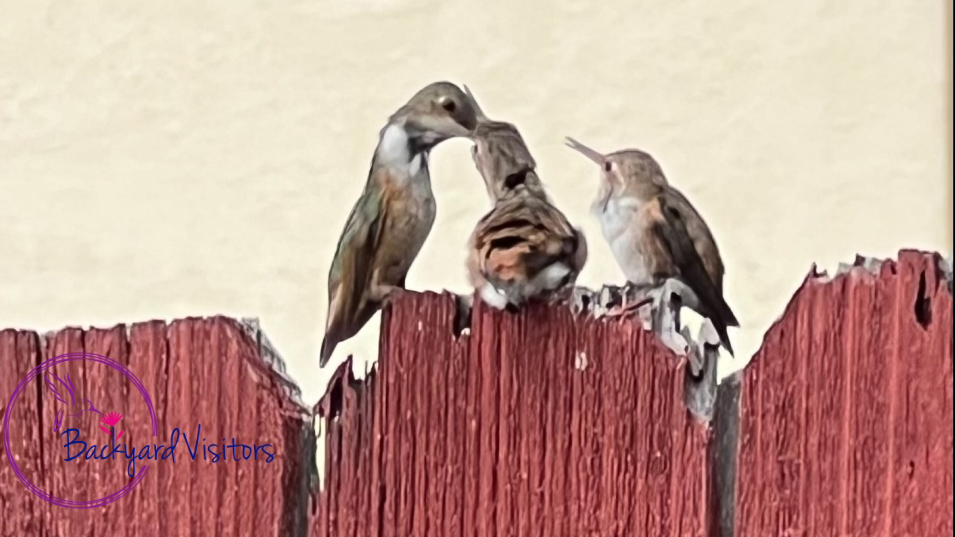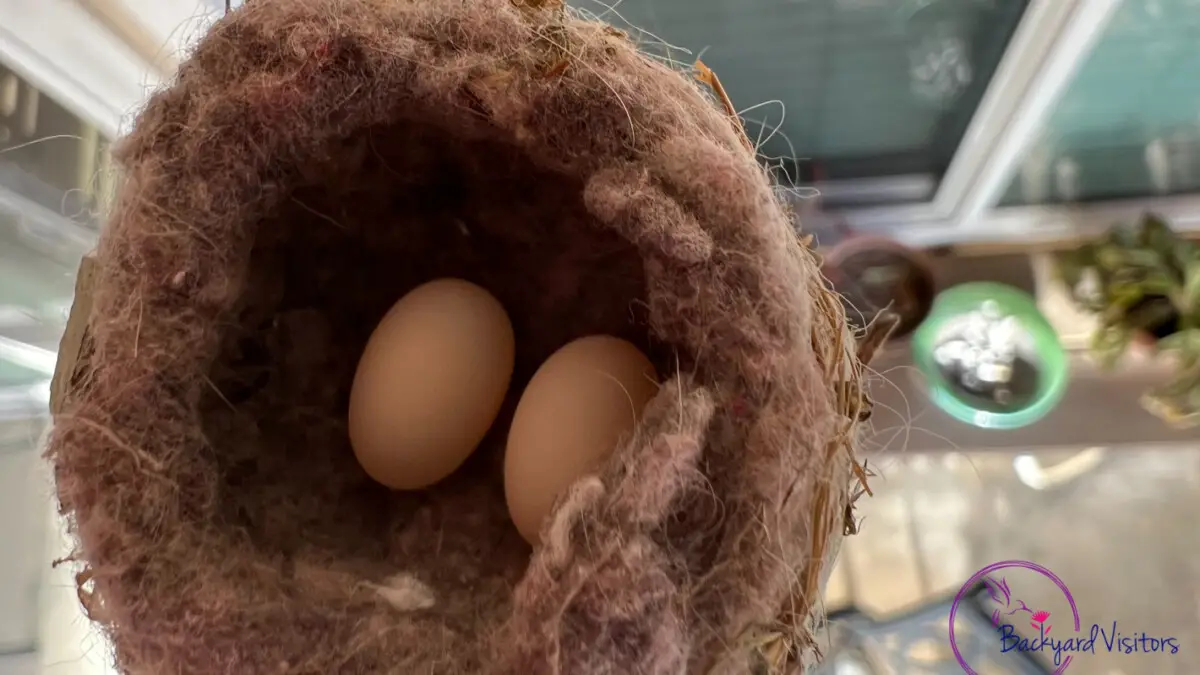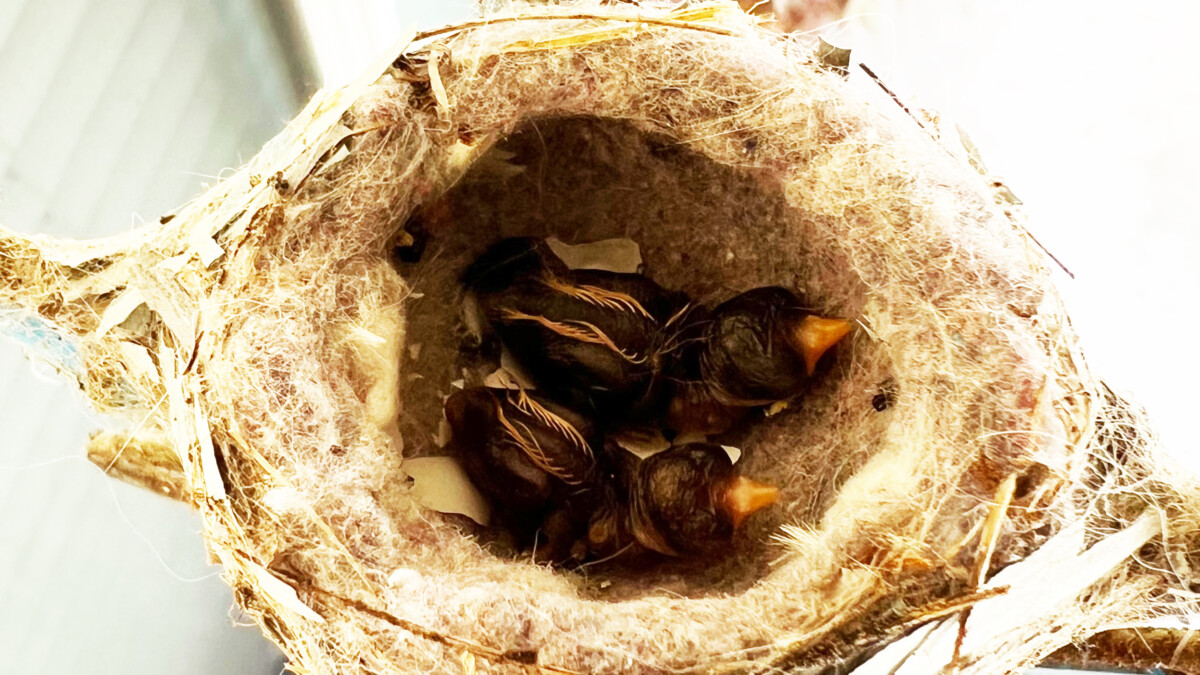This post contains affiliate links.
“Baby hummingbird” is a non-specific generic term that includes both hatchlings and fledglings.
This article covers both hatchling and fledgling baby hummingbirds in their various stages of development regarding their nightly routines and interactions with their mothers.
Do Baby Hummingbirds Eat at Night?
Baby hummingbirds, from hatchlings through fledglings and continuing into adulthood, do not typically eat at night. They are diurnal, therefore they feed during the day. During the night, hatchlings and fledglings enter a state of torpor, just like adult hummingbirds.
Both hatchling and fledgling hummingbirds are diurnal; therefore, the mother hummingbird only feeds the babies during the day.
As nightfall approaches, the mother hummingbird vigorously forages for food, supplementing their nectar-based sustenance with insects so that her babies have enough nutrition to sustain them through the night until daylight the next morning.
Below is a short video I found on YouTube of hatchlings being fed their last meal before going into torpor for the night:
To be efficient and as a means of energy conservation, these babies go into a state of torpor during the nighttime hours. Once the baby hummingbirds are in torpor, they do not awaken to feed again until the morning.
Since hummingbirds’ transition from torpor to awakening is guided by daylight, the mother hummingbird’s job becomes essential and urgent. She needs to kick-start herself out of her torpor, consume nutrition to fuel herself, and gather food to be ready to feed her babies as they come out of their torpor.
To learn more about hummingbird sleeping habits, see my article: Discovering Hummingbirds After Dark: (Where they Sleep)
Baby hummingbirds, whether hatchlings or fledglings are fed by the mother until they are independent.
Do Baby Hummingbirds go into Torpor at Night?
Baby hummingbirds, whether they are hatchlings or fledglings, enter a state of torpor at night; the same as adult hummingbirds.
Since hummingbirds are diurnal, when the daylight begins to wane, baby hummingbirds just like their adult partners are affected by the sun and prepare for the night. Since hatchlings are confined to the nest and rely on the mother hummingbird to feed them, they will wait patiently as the mother hummingbird becomes laser-focused on filling the hatchlings’ bellies and providing enough nutrition to sustain them through the night.
Fledglings, even though they are out of the nest, are still dependent on the mother hummingbird to feed them and also to teach them how to gather their food. Therefore, the mother hummingbird again is in a position needing to provide enough bugs and nectar to sustain her fledglings through the night. The difference is that the fledglings are bigger than hatchlings and require an increased quantity of food.
Once both the hatchlings and fledglings’ bellies are full and the sun has set, these babies go into a semi-hibernation called torpor and their heartbeat drops from 1200 beats per minute to 50 beats per minute. It remains at 50 beats per minute until they awaken once again in the morning.
Morning is a very stressful time of day for the mother hummingbird. Both she and her babies typically require about 25% of their total daily intake of nutrition in the 20 to 60 minutes required to completely awaken from torpor.
The hatchlings are safe and protected in their nest at night, and unless there is some catastrophe, such as a wildfire or preditors, these babies are tucked away safely in the structured nest the mother hummingbird has created.
To learn more about what kills hummingbirds, see my article: 10 Common Things That Kill Hummingbirds
The fledglings, once they fledge, do not return to the nest. They will, however, perch close to the nest as a common and familiar focal point for both the fledglings and the mother hummingbird.

A generous photo contribution from a reader, Cindy Hidden
During the three weeks that the fledglings are dependent on the mother hummingbird for food and education, and as the fledglings increase their independence and confidence, they perch farther away from the nest. This increases the mother hummingbird’s work of keeping track of her fledgling and continuing to feed them adequately.
As night falls, the mother hummingbird checks on her babies and then she must make sure that she has enough energy stored to make it through the night and to reverse the torpor in the morning so that she can start the cycle of feeding her babies as they come out of torpor with hungry appetites.
Do Hummingbirds Sit on Babies in the Nest at Night?
Mother hummingbirds sit on their babies in the nest at night until they grow enough feathers to keep themselves warm. She continues to sit on the hatchlings in the nest for approximately 2 weeks until their feathers and metabolism are sufficient to maintain their warmth.
A mother hummingbird lays 2 eggs after she constructs a nest. She sits and incubates her eggs for 3 weeks every day and every night, before they hatch; only taking breaks for food and to stretch.

Once the hatchlings emerge, they are naked and require additional warmth other than their own body heat for survival and depend on the mother’s warmth, especially during the night, to keep them alive as they await further feather development.
During the day, the mother hummingbird slowly begins to decrease the amount of time spent sitting on the hatchlings in the nest as she gathers food for her babies, but at night her body warmth is critical during the beginning stages of the hatchlings’ survival when the night temperatures decrease.
By two weeks after hatching the babies are fully feathered and are not dependent on their mother’s warmth. This allows the mother hummingbird to strategically perch on a nearby branch so that she can supervise and be ready to gather food for her hungry babies when they recover from torpor the next morning.
Fledglings, on the other hand, are fully feathered and also have their flying wings. Once they leave the nest, they will stay in close proximity to the nest as they strengthen their flight wings. This process takes 3 weeks. During this time, the mother hummingbird is close by as her fledglings find a tree limb to perch and torpor for the night.
Do Hummingbirds Leave Their Babies at Night?
Mother hummingbirds sit on their hatchlings at night for approximately two weeks until the hatchlings are fully feathered and no longer need supplemental body heat, at which time she roosts near the nest, not in the nest. Once the hatchlings fledge neither the babies nor the mother sleeps in the nest.
After building a nest, a mother hummingbird lays two eggs. She only takes breaks for nourishment and stretching during the day, but at night she sits and incubates her eggs uninterrupted for three weeks before they hatch.
Mother hummingbirds continually sit on their hatchlings at night for the first 2 weeks after which the hatchlings have developed enough feathers to then regulate their own body temperature through the night.
During the 3rd week, before the hatchlings have fledged, the mother hummingbird roosts on a branch near but not in the nest.
Once the babies have grown, developed feathers, and fledged, they find a branch near their nest for their nightly roost. Mother hummingbirds continue to take care of their young well after they have fledged and will torpor and sleep nearby at night.
Female hummingbirds have been known to have 2-3 clutches in a season therefore when the mother decides that her babies are independent and strong enough to take care of themselves, she will no longer be available both during the day and night.
I hope you are lucky enough to have a hummingbird nest built in an observable location for you to see this rapid and fascinating transition from egg to fledging in 6 weeks!
Check out my other posts on Hummingbird Questions
Happy Hummingbird Watching!
Backyard Visitors participates in affiliate programs which compensate us for referring traffic.


